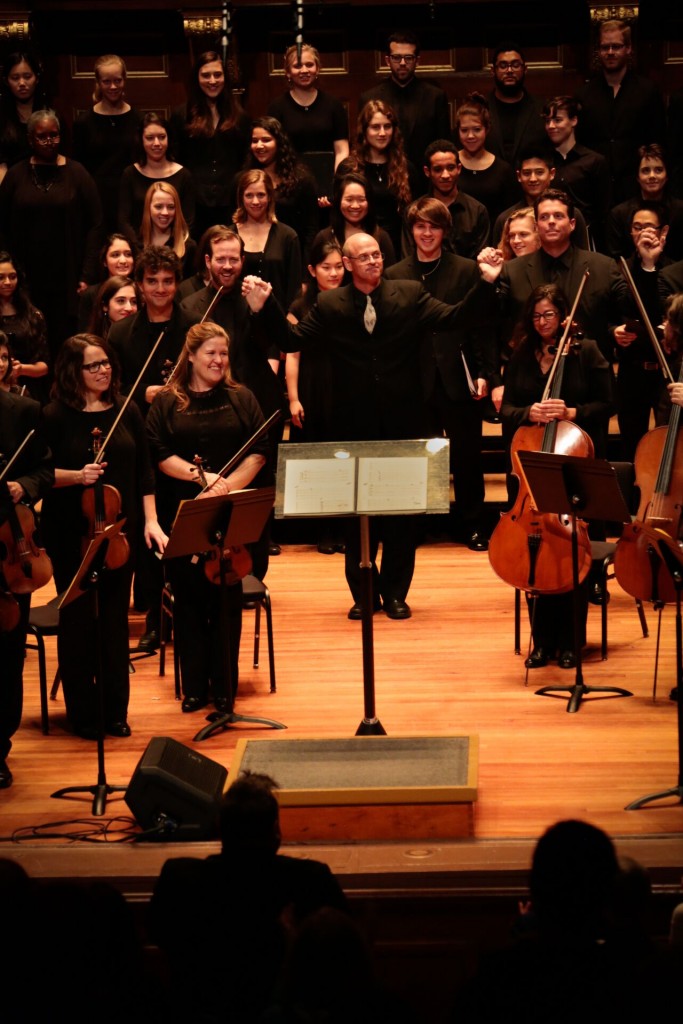Mansurian Requiem pays eloquent tribute to Armenia at BMOP

Gil Rose acknowledges applause following the Boston Modern Orchestra Project’s performance of Tigran Mansurian’s Requiem Sunday at Jordan Hall. Photo: Kathy Wittman
A gentle breeze from the Caucasus blew through New England Conservatory’s Jordan Hall Sunday afternoon as the Boston Modern Orchestra Project paid musical tribute to the folkways and spiritual character of the Armenian people.
The program, titled “Resilient Voices, 1915-2015,” joined the long list of observances in the Boston area this year commemorating what many consider to be the 20th century’s first genocide: the systematic killing and expulsion of millions of Armenians by the Ottoman government 100 years ago.
But sounds of violence or trauma were almost entirely absent from Sunday’s concert, which evoked instead a longing for the homeland and the quiet fortitude of a cohesive yet geographically scattered culture.
Epitomizing the “stranger in a strange land” nature of the Armenian experience, Tigran Mansurian’s Requiem for chorus, soloists, and string orchestra closed the program with a setting of the Catholic Latin mass for the dead in the chant-like accents and modal scales of the Armenian Apostolic Church.
In this 2011 work, the dean of Armenian composers used massed choral sound sparingly (but stunningly when he did), inclining instead toward single vocal lines that intertwined with the string parts in a variety of ways, or subtle interplay between sections of the chorus.
Mansurian responded to the emotions embedded in the Latin text with a broad palette of moods and timbres, from the soft, fluid complex chords of “Lacrimosa” to the charmingly irregular dance rhythms of “Kyrie” to the more agitated dance of “Dies irae,” dwindling to a spooky chatter of col legno strings.
The effect of all this imagination was not merely a parade of novelties, but a many-sided meditation on an ancient Western text, fed by equally ancient Eastern musical roots.
Opening the work a capella and pianissimo on the word “Requiem,” the chorus—comprising the Harvard-Radcliffe Collegium Musicum (Andrew Clark, conductor) and the Boston University Marsh Chapel Choir (Scott Allen Jarrett, conductor)—signaled its excellent preparation immediately with superbly tuned and shaped long chords. Thereafter it deftly adjusted timbre and diction to the mood of the moment—for example, each of the much-repeated K’s in “Kyrie” became a little drum stroke to drive the imaginary dancers forward.
Two vocal soloists made brief but memorable contributions. Vartan Gabrielian’s rich yet focused baritone sounded a convincing trumpet at “Tuba mirum,” while Serena Alexandra Tchorbajian’s light, clear soprano, with its touch of fluttering vibrato, responded in plaintive tones with “Mors stupebit.
The first half of Sunday’s program consisted of three shorter works, two with Armenian roots and one by an Israeli composer, all in the reflective spirit of the occasion.
The priest, composer, and folklorist Komitas Vardapet (1869-1935) was both a scholar of ancient Armenian music and its first exponent in the Western-style concert hall. Sunday’s concert began with his setting of the tender folk song “Yerkinqn ampel a” (Cloudy Sky), arranged for string orchestra by Komitas’s friend, the cellist Sergei Aslamazyan. Bartókian lean harmonies jostled with Dvořákian lush string sound as the nostalgic melody unfolded over three stanzas, each more embellished than the last.
The Armenian-Scottish-American composer Alan Hovhaness was in his thirties when he began seriously exploring his Armenian roots, and in particular the works of Komitas Vardapet. One of the fruits of this study was Khrimian Hairig, a piece for trumpet and strings named for the 19th-century priest and leader who was something of a Martin Luther King, Jr. figure to Armenians in the Ottoman Empire.
On Sunday, trumpeter Terry Everson and the orchestra painted this musical portrait in gleaming tones and modal string harmonies that might recall Elizabethan music or Vaughan Williams. Everson’s well-supported and shapely intonation of the long chant phrases vividly evoked the legendary leader’s eloquence in the pulpit.
Everson was also to have played the conspicuous trumpet solo in Shostakovich’s Piano Concerto No. 1, but the work had to be withdrawn owing to the pianist’s illness. A happy substitute was found in Betty Olivero’s Neharót, Neharót for viola, accordion, percussion, two string ensembles, and magnetic tape.
Although the work’s instrumentation suggests a P.D.Q. Bach-like cacophony, the result on Sunday was anything but, as Kim Kashkashian’s eloquent viola led the way in a meditation on sounds of lament, including recordings of women singing of their grief during the Israel-Lebanon war of 2006.
In a subsidiary but essential role, Cory Pesaturo’s accordion contributed gentle counterpoints in that achingly nostalgic tone that is his instrument’s special province. Throughout the work, percussionist Robert Schulz subtly colored the orchestral tone with soft strokes on the bass drum or gong, or with shimmering tremolos on vibraphone.
In this work, as throughout the program, Gil Rose conducted with unfailing sensitivity to balance, the blend of tone colors, and emotional nuance.
The Hebrew word neharót means rivers, as in the rivers of tears shed during wars and disasters. But the increasing vigor of Kashkashian’s playing throughout the piece reminded the listener that (as noted by the composer in the program notes) the word “nahar” (river) is close to “nehara,” meaning a ray of light, and so the title “contains also an element of hope.”
It’s fair to say the entire concert, closing with Mansurian’s eloquent testimony to the enduring strength and adaptability of Armenian culture, contained more than just an element of hope for the human spirit.
The next concert of Boston Modern Orchestra Project will be a memorial concert for Gunther Schuller, 3 p.m. Nov. 22 at NEC’s Jordan Hall. bmop.org; 781-324-0396.
Posted in Performances